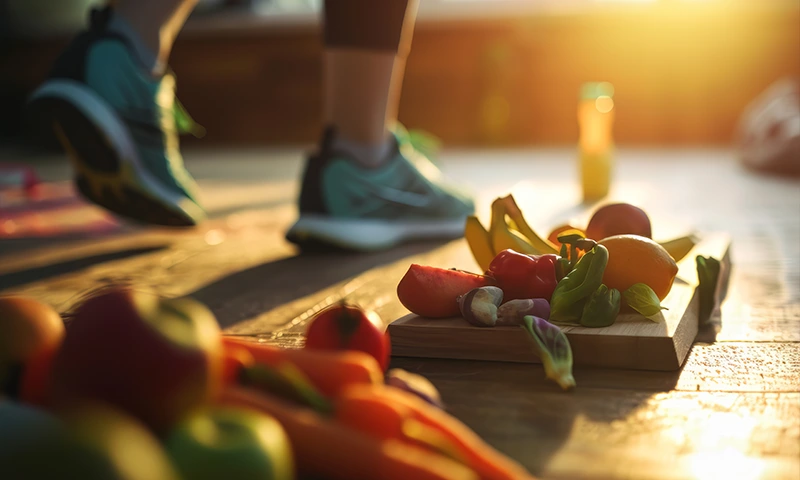Game-Changing Nutrition Tips to Boost Your Athletic Performance
If you want to do well in sports and fitness, nutrition is usually the factor that makes the difference between good and great. The foods you eat can greatly affect how well you do in any activity if you are already an athlete or if you are just beginning your fitness journey. This article will examine revolutionary dietary suggestions for improving athletic performance and taking your training to another level.
Understanding the Role of Nutrition in Athletic Performance
Before diving into the specific tips, it’s essential to understand why nutrition is crucial for athletes. Your body is like a finely tuned machine, and just like any machine, it needs the right fuel to perform at its best. Proper nutrition provides the energy required for training, aids in recovery, and ensures that your body functions optimally.
Macronutrients: The Building Blocks of Athletic Success
Macronutrients are the nutrients your body needs in large amounts: carbohydrates, proteins, and fats. Each of these plays a critical role in fueling your workouts and supporting recovery.
1. Carbohydrates: The Body’s Main Source of Energy
The larger the exercise intensity, the more carbohydrates the body should use as its energy. When you eat carbohydrates they break down into glucose which is used in powering muscles during workouts. For athletes it’s important for them to consume complex carbohydrates such as whole grains, fruits and vegetables that provide constant amounts of energy.
2. Protein: Muscle Repair and Growth
Protein is needed for restoration and building muscle tissue which is important to athletes who take part in strength training or endurance sports. All meals should consist of high-quality protein sources like lean meats, eggs, dairy products or plant-based alternatives such as beans and legumes.
3. Fats: The Perennial Energy Source
Fats are an enhanced source of the energy that can last for long durations. Often misrepresented, they play an important role for athletes especially in long distance events. Good examples of healthy fat are those from say avocados, nuts, seeds and olive oil.
The Micronutrients that Maven Heroes of Performance
There are many different nutrients that can keep you going, but they might not be widely acknowledged. Although macronutrients form the energy and protein components in large quantities, micronutrients such as vitamins and minerals are also necessary. These essential elements contribute to the body’s physiological processes including the production of energy, movement, and recuperation.
4. Iron: Necessary for Delivery of Gas in Body
Shuttling of gases is largely determined by presence of iron in the body system. If there is not enough iron, one may get tired and perform poorly. Spinach, red meat as well as fortified cereals are some examples of foods that contain high amounts of this mineral which athletes need especially women.
5. Calcium and Vitamin D: Healthy Bones and Muscles
To ensure strong bones and proper functioning of muscles, a combination of calcium with vitamin D would be required. These nutrients can be obtained from dairy products, green leafy vegetables or by being exposed to sunlight. Weight trainers should monitor their dietary intake carefully.
6. Electrolytes: Keeping Hydrated and in Balance
Electrolytes such as sodium, potassium and magnesium help to ensure proper levels of fluidity and reduce muscle cramps during workouts . Sports energy drinks or electrolyte-rich fruits like bananas or coconut water may assist understand these critical minerals.
Timing Your Nutrition for Optimal Performance
The moment of consumption has a huge impact on our execution along with eating choices. For optimal sports performance, proper timing guarantees sufficient energy availability during workouts and required repair materials after intense activity.
7. Pre-Workout Nutrition: Fueling Up for Success
Proper pre-exercise nutrition improves athletic performance if done correctly. An appropriate meal consists of carbohydrates and protein taken two or three hours before a physical exercise. If you do not have much time before training starts, then a small food item such as a banana with some peanut butter or a protein shake will do fine to give that quick burst of energy needed.
8. Replenishment after Exercise: It Matters
Your post-exercise diet holds nearly as much weight as the pre-exercise one. Eating protein with carbohydrates in combination within a time limit of 30 minutes to one hour after performing any physical activity allows for proper replenishment of glycogen reservoirs and recovery of muscle cells from damage sustained during workouts. For instance, if someone is looking for an appropriate meal that meets these conditions, it could consist of grilled chicken coupled with sweet potatoes or a fruit smoothie along with some protein powder.
9. Hydration – The Foundation Of Performance
Staying hydrated is vital for sportsmen, mild dehydration is enough to disrupt their performance. Throughout day drinking water must be uninterrupted while exercising should come with enhanced intake levels. In highly humid and hot environments, athletes may have to take in sports drinks that are electrolyte-based so as not to lose fluids quickly.
Special Considerations for Different Types of Athletes
As an athlete, you may need to take special care of your diet depending on the sport you play. Your nutritional requirements can help you adjust what you eat for maximum performance.
10. Endurance athletes are usually known for their carbohydrate loading while cycling or marathon racing
These athletes like Marathon runners and Cyclists often use carbohydrate loading before events in order to utilize their glycogen stores fully. Moreover, energy gels and drinks serve as a quick source of carbs during bush runs so they can maintain their pace throughout the race.
11. Protein Timing and Muscle Building for Strength Athletes
To facilitate muscle growth, strength athletes such as weightlifters need to consume protein at regular intervals throughout the day. Post-workout protein consumption is crucial for total muscle repair and hypertrophy.
12. Balancing Energy and Recovery for Team Sport Athletes
Team sport athletes such as soccer players or basketball players should have a balanced approach that supports both energy and recovery. A proper diet of complex carbohydrates, lean proteins, healthy fats as well as appropriate hydrating fluids can sustain energy during playing sessions while assisting in post-game recuperation.
The Importance of Personalized Nutrition Plans
While these tips give a total structure, it’s still necessary to note that individual requirements in nutrition differ. Age, sex, composition of body as well as nature of the sport being played should all be considered when making a nutrition plan. You should go for a sports nutritionist who would monitor your eating habits so as to come up with one that suits you best.
Conclusion: Fuel Your Body, Elevate Your Performance
In summary, without any doubt nutrition is an essential element in sports performance. Eating the right amounts of macronutrients and micronutrients at proper times and personalizing diets to fit particular needs are among the ways that improve performance greatly. It is important to understand from this paragraph that success is not only through intensive training but also making sure our bodies get the right nutrients for maximum output.




